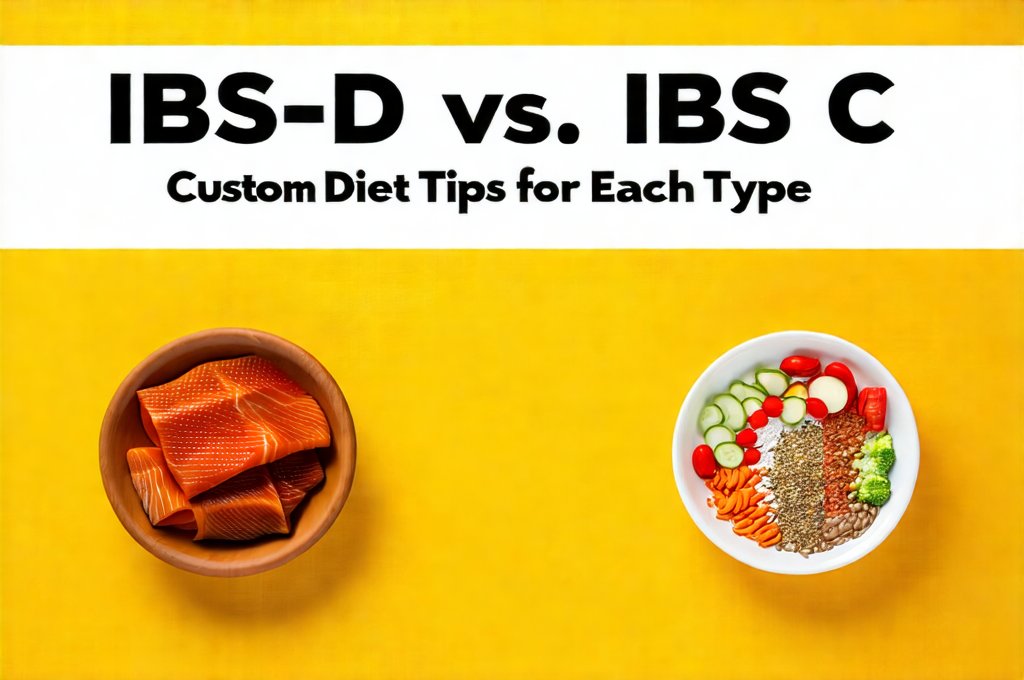Irritable Bowel Syndrome (IBS) is a common gastrointestinal disorder affecting millions worldwide, characterized by abdominal pain, bloating, gas, diarrhea, and/or constipation. However, IBS isn’t one-size-fits-all; it presents differently in individuals, leading to distinct subtypes based on predominant bowel habits. Understanding these subtypes – specifically Diarrhea (IBS-D) and Constipation (IBS-C) – is crucial for tailoring dietary strategies that can significantly improve symptoms and quality of life. Many people are diagnosed with IBS without knowing which subtype they have, leading to ineffective management attempts. A personalized approach, beginning with accurate diagnosis and a diet specifically geared toward your dominant symptom pattern, offers the most promising path to relief.
The key difference between IBS-D and IBS-C lies in the frequency and consistency of bowel movements. Individuals with IBS-D experience frequent loose stools, often accompanied by urgency and abdominal cramping. Conversely, those with IBS-C struggle with infrequent, hard stools requiring significant effort to pass, leading to feelings of bloating and discomfort. It’s important to note that some individuals may experience mixed symptoms (IBS-M), alternating between diarrhea and constipation, but even within this subtype, a predominant pattern often emerges. Dietary modifications are not about eliminating entire food groups unnecessarily; they’re about identifying triggers, optimizing gut health, and finding a balance that allows for comfortable digestion. It’s important to address the root cause of discomfort – consider daily microbiome maintenance tips as part of your routine.
Understanding the Subtypes: IBS-D & IBS-C
IBS-D is characterized by stools that are frequently loose or watery. This can lead to dehydration if not managed properly, and the urgency associated with it can severely impact daily life. Individuals often report feeling anxious about leaving home due to fear of unpredictable bowel movements. Dietarily, managing IBS-D involves focusing on slowing down digestion, reducing gut fermentation (which creates gas), and ensuring adequate hydration. This isn’t always about eliminating fiber; sometimes soluble fiber can be beneficial in absorbing excess water. Identifying food sensitivities is also paramount; what triggers one person with IBS-D may not affect another. If you are considering a significant dietary change, tips for transitioning can help minimize discomfort.
IBS-C, on the other hand, presents a different set of challenges. The difficulty passing stools leads to build-up and bloating, which can be incredibly uncomfortable and even painful. Individuals might experience feelings of fullness even after eating small amounts. Dietary management focuses on increasing fluid intake, incorporating sufficient (but not excessive) fiber – primarily insoluble fiber – and promoting regular bowel movements through gentle stimulation. Often, the problem isn’t a lack of fiber, but rather dehydration or insufficient physical activity that hinders intestinal motility. It’s also important to rule out other causes of constipation before assuming it is solely IBS-related.
Dietary Strategies for IBS-D: Calming the Storm
For those with IBS-D, the primary goal is to reduce gut irritation and slow down digestion. This can be achieved through several dietary adjustments. First, consider a low-FODMAP diet under the guidance of a healthcare professional. FODMAPs (Fermentable Oligosaccharides, Disaccharides, Monosaccharides, and Polyols) are short-chain carbohydrates that are poorly absorbed in the small intestine, leading to fermentation by gut bacteria and subsequent gas production. Reducing FODMAP intake can significantly alleviate symptoms for many with IBS-D. – Limit high-FODMAP foods like onions, garlic, apples, pears, wheat, and dairy (lactose). – Introduce low-FODMAP alternatives gradually.
Secondly, focus on easily digestible foods. Lean proteins such as chicken or fish are generally well tolerated. Cooked vegetables that are low in fiber and fat – think carrots, green beans, spinach – are preferable to raw options. Rice and gluten-free grains can provide a source of energy without exacerbating symptoms. Finally, hydration is key! Diarrhea leads to fluid loss, so it’s vital to replenish electrolytes by drinking water throughout the day. Consider incorporating oral rehydration solutions if necessary. A food diary is incredibly useful in pinpointing individual trigger foods and identifying patterns between diet and symptom flare-ups. Understanding how gut microbiome composition can also inform your dietary choices.
Dietary Strategies for IBS-C: Getting Things Moving
Managing IBS-C requires a different approach, focusing on increasing fiber intake (carefully), staying hydrated, and stimulating bowel motility. Insoluble fiber, found in whole grains, bran, and vegetables like broccoli and cabbage, adds bulk to the stool, encouraging regular bowel movements. However, it’s crucial to increase fiber gradually to avoid bloating and gas. Suddenly increasing fiber can actually worsen symptoms for some individuals with IBS-C. – Start with small amounts of fiber-rich foods and slowly increase intake over several weeks.
Hydration is equally important. Water helps soften the stool, making it easier to pass. Aim for at least eight glasses of water per day. Regular physical activity also plays a role in stimulating gut motility. Even a 30-minute walk each day can make a significant difference. Consider incorporating probiotic-rich foods like yogurt (if tolerated) or kefir into your diet to promote a healthy gut microbiome, which may improve bowel function. It’s important to note that some individuals with IBS-C find relief from small amounts of coffee in the morning – caffeine can stimulate bowel movements, but it’s not suitable for everyone and should be used cautiously. If you have nightshade sensitivities, explore diet tips to avoid potential triggers.
Navigating Common Challenges & Individualizing Your Approach
One of the biggest challenges in managing IBS is its highly individual nature. What works for one person may not work for another, making dietary experimentation essential. A food diary is your best friend – meticulously track what you eat, how you feel, and any corresponding symptoms to identify potential triggers. Don’t fall into the trap of restrictive diets that eliminate entire food groups without proper assessment; this can lead to nutrient deficiencies and psychological stress. – Work with a registered dietitian or healthcare professional experienced in IBS management to develop a personalized plan.
Another common challenge is dealing with “safe foods.” While it’s comforting to stick to what you know doesn’t cause immediate problems, relying solely on a limited range of foods can be restrictive and unsatisfying. Gradually introduce new foods one at a time, paying close attention to your body’s response. Be mindful of portion sizes; even tolerated foods can cause symptoms if eaten in excess. Lastly, remember that stress management is crucial. Stress can significantly exacerbate IBS symptoms, so incorporate relaxation techniques like yoga, meditation, or deep breathing exercises into your routine. Ultimately, successful IBS management isn’t about finding a cure; it’s about learning to live comfortably with the condition through informed self-care and personalized strategies. Maintaining a healthy liver through diet can also have a positive impact on overall digestive health.


















